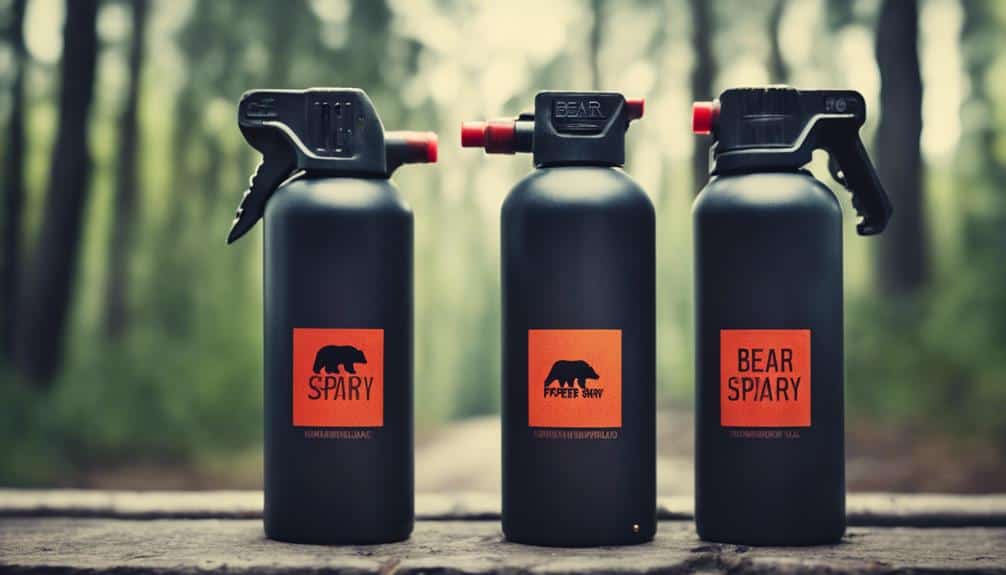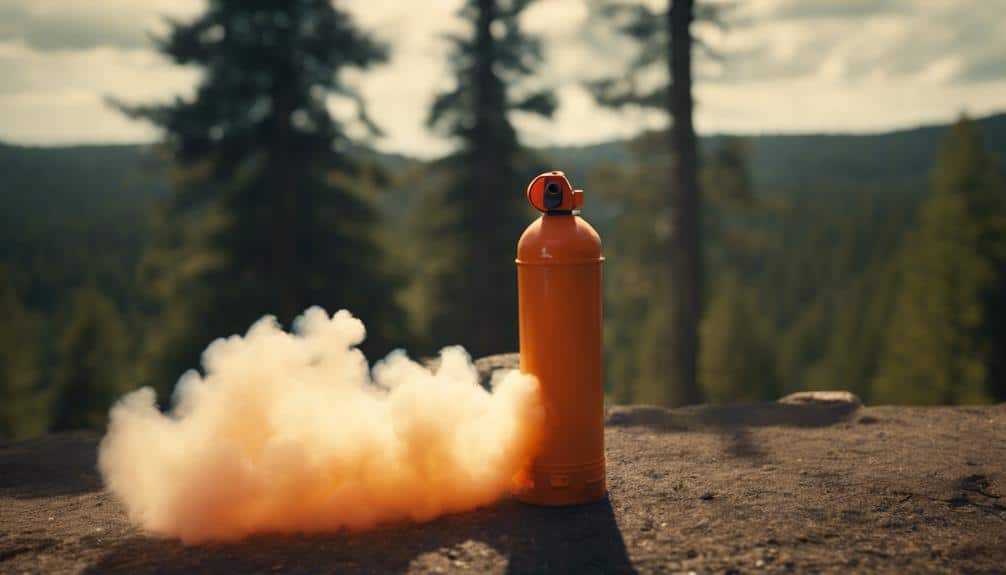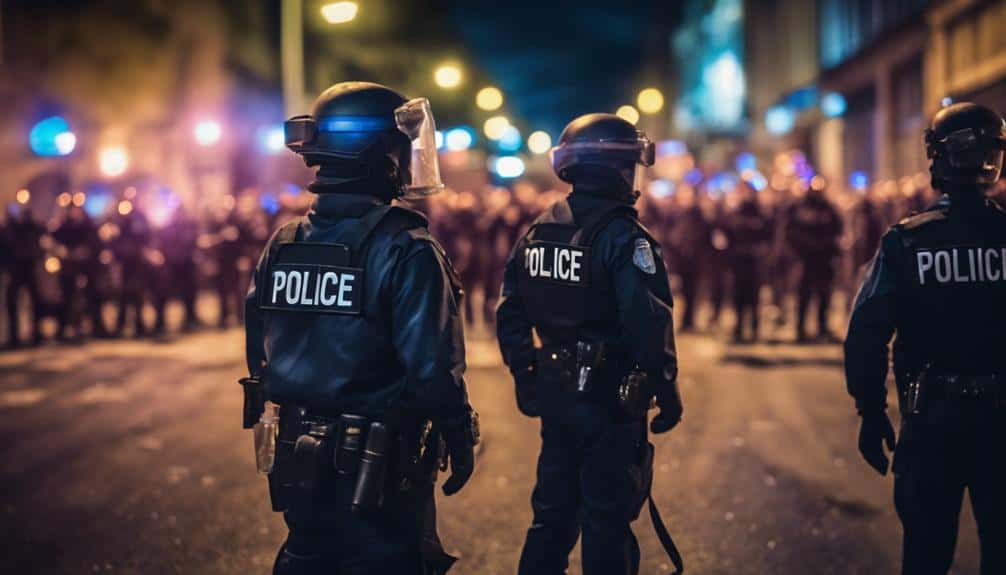It’s a coincidence you’re asking about
bear spray’s legality just as more people are questioning
self-defense methods. You might think using bear spray on humans is similar to pepper spray, but the
legal and safety implications differ greatly. Have you ever wondered why bear spray is strictly for
animal deterrence? Misusing it can not only land you in legal trouble but also cause severe health issues. Curious about the distinctions between bear spray and other self-defense products, and the potential consequences of improper use? Let’s explore this complex and essential topic.
Bear Spray Vs. Pepper Spray
When comparing
bear spray to
pepper spray, it’s essential to understand their
distinct formulations and intended uses. Bear spray, with a capsaicin concentration of up to 2%, is designed to deter bears, while
pepper spray, maxing out at 1.4%, is intended for
self-defense against humans. The
effective range of bear spray can reach up to 40 feet, creating a fog pattern for broader coverage, which is vital during animal encounters. In contrast, pepper spray typically has a range of about 10 feet and is delivered in a concentrated stream.
Imagine you’re hiking in bear country; you wouldn’t want to rely on pepper spray with its limited range and potency. Bear spray is specifically engineered to keep bears at a distance, providing a safer option for such encounters. However, remember, using bear spray on humans isn’t just ineffective; it comes with serious
legal repercussions. It’s illegal and can lead to hefty fines or worse.
Differences in Formulation
Understanding the differences in formulation between bear spray and pepper spray can help clarify why each is suited to its specific purpose. Bear spray has a higher capsaicin concentration, up to 2%, compared to pepper spray’s maximum of 1.4%. This heightened concentration makes bear spray a powerhouse when facing a bear, but it’s not meant for self-defense against humans.
Bear spray and pepper spray both contain oleoresin capsicum, yet their formulations differ considerably. Bear spray includes extra ingredients tailored to be more effective against bears, enhancing its deterrent capabilities. It’s dispensed in a fog pattern, giving it a range of up to 40 feet, whereas pepper spray typically reaches only about 10 feet. This difference in range can mean the difference between a safe retreat and a close encounter of the furred kind.
| Aspect |
Bear Spray |
Pepper Spray |
| Capsaicin Concentration |
Up to 2% |
Maximum 1.4% |
| Effective Range |
Up to 40 feet |
Approximately 10 feet |
| Intended Use |
Deterring bears |
Self-defense against humans |
Bear spray’s formulation is designed to cause immediate discomfort and panic in bears, making it illegal to use on humans. It’s essential to use each spray according to its intended use for safety and effectiveness.
Legal Considerations
Bear spray’s
intended purpose is clear: it’s designed to
deter aggressive bears, not to be used on humans. Using
bear spray on humans is
illegal and can lead to
serious legal repercussions. The product label explicitly warns against using it on humans or domestic animals, making its intended use unmistakable. If you disregard this and use bear spray on a person, you could face lawsuits or criminal charges, depending on
local laws.
In many jurisdictions, bear spray falls under the category of
self-defense products, which are subject to specific regulations. Misusing it can result in
severe penalties. For instance, in Oregon, the
misuse of bear spray could land you in hot water under the Oregon Revised Statutes (ORS) that govern self-defense products. Additionally, like
Mace pepper spray, bear spray causes severe irritation and temporary blindness, making it a potent deterrent but also a dangerous one when misused. It’s crucial to understand these local laws to avoid legal pitfalls.
Imagine spraying someone with bear spray and then explaining that to a judge! Not exactly a winning argument. Always check the legalities in your area before considering any self-defense product. Remember, what works on bears in the wild won’t necessarily be legal—or safe—when used on humans. So, save the bear spray for your next camping trip, not for personal disputes.
Self-Defense Use
In the domain of self-defense, it is vital to choose the right tool for the job. You might think bear spray is a great option but using it on humans comes with serious legal implications. Bear spray is designed to deter aggressive bears, not people. Its label clearly states it isn’t for human self-defense and misusing it can lead to severe injuries.
Legal regulations vary by region, so understanding local laws about self-defense products is essential. Using bear spray on someone can lead to:
- Irreversible eye damage: This potent spray can cause lasting harm to a person’s eyes.
- Respiratory issues: Inhalation can result in serious breathing problems.
- Legal repercussions: You could face lawsuits or charges of reckless endangerment.
Law enforcement agencies advise against using bear spray for self-defense because of these severe consequences. Instead, seek guidance on appropriate self-defense products that comply with local laws. Remember, the goal is to protect yourself without causing undue harm or landing in legal trouble. So, while bear spray might seem like a powerful deterrent, its misuse can backfire in more ways than one.
Effectiveness and Safety
When it comes to deterring
aggressive behavior,
bear spray might seem like a powerful tool but using it on humans is a recipe for disaster. Its high capsaicin concentration can cause
severe health risks, such as irreversible eye damage and intense respiratory distress—imagine trying to explain that at a dinner party! Plus, the legal implications are no joke; you could face lawsuits and criminal charges, so it’s best to stick with products designed for human self-defense.
Understanding self-defense laws is essential for compliance to avoid legal trouble and guarantee personal safety.
Deterring Aggressive Behavior
Many people turn to bear spray as a reliable tool for deterring aggressive animals, and its effectiveness and safety in such situations are well-documented. Bear spray is specifically designed to handle encounters with aggressive animals like bears, boasting a success rate of 90% to 98% in preventing attacks. When used correctly, it creates a potent fog that can reach 30 to 40 feet, causing immediate eye, nose, and lung irritation, which leads the animal to panic and flee.
However, it’s essential to remember that bear spray is regulated by the EPA and is intended only for use on bears. Misuse of bear spray on humans can lead to severe health effects, such as irreversible eye damage and respiratory issues, underscoring the importance of using it strictly as directed.
Consider these points:
- Coverage: The broad reach of bear spray reduces the necessity for precise aim, unlike firearms.
- Behavioral Change: The spray alters aggressive behavior in bears, decreasing future confrontations.
- Regulation: Bear spray is regulated as a pesticide, making improper use illegal and dangerous.
Health Risks Involved
Bear spray, designed for deterring aggressive wildlife, poses significant
health risks when misused on humans. If you think it’s a handy
self-defense tool, think again.
Bear spray contains
capsaicin, a fiery compound that can wreak havoc on the human body. With concentrations up to 2%, it’s way stronger than your average pepper spray. When sprayed, it causes
temporary blindness, nasal congestion, and
breathing difficulties, which might sound short-lived but are incredibly distressing.
Imagine being hit with something that makes your eyes feel like they’re on fire and your lungs seize up. For those with pre-existing respiratory conditions, such as asthma, exposure could lead to bronchospasms or wheezing, putting them at severe risk. And don’t even think about using it up close—bear spray can cause
irreversible eye damage, leading to a lifetime of regret.
The
legal consequences you could face for using bear spray on humans are serious, but the health risks are immediate and alarming. So, next time you’re thinking about reaching for that can of bear spray, remember it’s a tool for the wild, not a weapon for the streets. Save it for the bears and avoid a painful, potentially dangerous mistake.
Legal Implications
The legality of using bear spray on humans isn’t just a matter of breaking a rule; it carries significant consequences. Bear spray is illegal for use on humans because it’s specifically designed for deterring aggressive bears, not people. The product labels clearly state it’s not intended for domestic animals or humans, emphasizing its intended wilderness purpose. So, if you find yourself considering bear spray for self-defense, think twice. Misuse can lead to severe legal repercussions, including potential lawsuits and criminal charges.
Using bear spray against a person could fall under laws governing the unlawful use of tear gas or similar agents. Depending on your location, the legal landscape can vary, making it essential to understand local laws to avoid getting into serious trouble. Here’s why it’s important:
- Legal Repercussions: You could face criminal charges or lawsuits.
- Misuse: You might violate laws specific to tear gas and similar agents.
- Self-Defense: Bear spray isn’t designed for this and using it could backfire legally.
Always opt for legally approved self-defense tools. It’s better to be safe and law-abiding than to face the dire consequences of misusing bear spray.
Bear Spray in Assaults
When it comes to the
misuse of bear spray in assaults, especially during protests, you’re treading on
dangerous and illegal ground. Bear spray, with its higher potency compared to traditional pepper spray, has shown up in violent encounters like the 2010 G20 summit and the 2021 Capitol riot, leading to
severe legal consequences and serious health risks. Authorities are cracking down on its use, confiscating it at events, so think twice before considering it as a tool for anything other than warding off actual bears—unless you want a courtroom drama with a side of
potential jail time!
Increased Misuse in Protests
In recent years, a notable rise in the
misuse of bear spray during
protests has alarmed both authorities and the public. This troubling trend has been evident in
high-profile events like the 2010 G20 summit in Toronto and the 2020 Portland riots. Bear spray, initially designed to deter aggressive bears, has found its way into human confrontations, causing
severe irritation and
respiratory issues due to its high concentration of capsaicin.
Law enforcement officers, unfortunately, have also been on the receiving end. For instance, during the January 6 Capitol riot, bear spray was
weaponized against them, highlighting its misuse beyond peaceful protest.
The increased availability of bear spray at outdoor and sporting goods stores has only made it easier for individuals to obtain and misuse it during
civil unrest. This potent spray can cause significant harm when used improperly, and its effects on humans can be far more severe than those of standard pepper spray.
- Bear spray incidents often lead to severe irritation and respiratory issues.
- High-profile protests have seen increased misuse of bear spray.
- Law enforcement officers have been targeted with this potent spray.
This dangerous trend underscores the need for
stricter regulations and awareness.
Legal Repercussions Overview
Contrary to its intended purpose, using
bear spray on humans isn’t just dangerous but also illegal. Bear spray is classified as a
self-defense product meant for deterring bears, not people. Misusing it in an assault can land you in serious trouble, starting with
criminal charges. You could be charged with
assault or battery, especially if the victim suffers significant harm. The label on bear spray clearly advises against using it on humans or domestic animals, highlighting the
legal liabilities associated with such misuse.
Legal repercussions vary by state or country, as some jurisdictions have specific laws regulating the use of self-defense sprays, including bear spray. Imagine you were in a heated argument, and you impulsively used bear spray; you might find yourself facing not only criminal charges but also
civil suits from the victim for damages. That’s a double whammy you definitely don’t want.
Comparative Potency and Risks
Bear spray isn’t just another self-defense tool—it’s a powerful substance with a level of potency that far exceeds standard pepper spray. With capsaicin content reaching up to 2% and a Scoville Heat Unit (SHU) rating of 3 million, bear spray is designed to stop a charging bear in its tracks. In comparison, pepper spray typically contains 1 million SHUs. The pressurized fog pattern of bear spray can reach distances of 30 to 35 feet, making it particularly dangerous when misused in assaults.
Using bear spray on humans can cause serious harm, such as irreversible eye damage and severe respiratory issues. Its misuse has been increasingly reported during protests and riots, where its powerful effects are exploited beyond its intended purpose.
- Higher capsaicin content: Bear spray’s capsaicin level is markedly higher than that of regular pepper spray.
- Extended reach: Its dispersion pattern allows it to cover more ground, making it more effective but also more hazardous.
- Legal repercussions: Using bear spray on humans is illegal and can result in criminal charges and lawsuits.
Given these factors, the legal repercussions for using bear spray on humans can be severe, emphasizing the need for responsible use.
Law Enforcement Response
Law enforcement officials make it clear that using
bear spray on humans is
illegal and can result in severe
legal consequences, including charges and lawsuits. When you use bear spray, even in
self-defense,
law enforcement might not be on your side. The legal consequences could be intimidating, and you’ll likely face skepticism from the police about your self-defense claims. It’s critical to understand your
rights and responsibilities to navigate the situation effectively.
Systemic biases can further complicate things. For instance, a startling example involves police recommending lethal force during a home invasion if the intruder spoke English, hinting at inherent biases. This isn’t just a one-off; interactions with law enforcement after a bear spray incident can differ dramatically based on your racial or ethnic background. It’s a harsh reality that underscores the importance of being well-informed.
If you find yourself involved in a bear spray incident, consulting with
legal experts is paramount. They’ll help you understand the potential legal repercussions and build a
robust defense. Remember, knowing your rights and responsibilities isn’t just smart—it’s your best line of defense in a complicated legal landscape.
Social and Moral Implications
Using bear spray on humans carries significant social and moral implications that can’t be ignored. You might think bear spray is a convenient self-defense tool, but its misuse can lead to serious harm and ethical dilemmas. When you use bear spray on a person, you’re not just crossing a legal line; you’re risking irreversible eye damage or severe respiratory issues for the other party.
Consider the following:
- Legal repercussions: Using bear spray on humans is illegal, leading to potential lawsuits and criminal charges.
- Moral responsibility: As a responsible individual, it’s vital to understand and respect the intended use of such products.
- Ethical considerations: Bear spray is designed for large, aggressive animals, not human conflicts, making its use on people morally questionable.
It’s essential to recognize that, while self-defense is a legitimate concern, the legal frameworks like the Oregon Revised Statutes are clear about the unlawful use of certain defense products. Ignoring these guidelines not only jeopardizes your legal standing but also calls into question your ethical judgment. So, the next time you’re considering bear spray for protection, remember the serious legal and moral responsibilities involved. Choose wisely, and always prioritize humane solutions.
Frequently Asked Questions
What Happens if You Use Bear Spray on a Human?
If you use bear spray on a human, you risk significant health effects like respiratory issues and eye damage. Misuse incidents can lead to serious legal consequences. Consider alternative self-defense methods for public safety and animal encounters.
Using bear spray for self-defense is playing with fire. It’s not just ineffective; it carries severe legal consequences. Instead, explore alternative deterrents, follow safety precautions, and consider ethical considerations for proper usage against human threats.
Can You Use Bear Repellent Spray on Humans?
You shouldn’t use bear spray on humans due to its high capsaicin concentration. While effective against animal encounters, it poses serious human safety risks. Legal implications can arise, so consider alternative defenses for personal protection.
In What States Is Bear Spray Illegal?
Bear spray regulations vary by state, so you need to check local state laws. Using bear spray on humans can lead to serious legal consequences. Remember, self-defense laws don’t cover bear spray since it’s for animal protection and public safety.









One Response